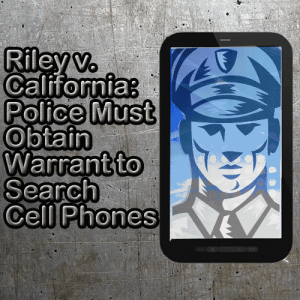Riley v. California: Police Must Obtain Warrant to Search Cell Phones

In Riley v. California, the majority held that police officers must obtain a warrant
The U.S. Supreme Court recently issued its most important privacy decision in four decades. In Riley v. California, the majority held that police officers must obtain a warrant prior to searching a suspect’s cell phone during the course of an arrest.
Factual History
The Court’s opinion addressed two cases that raised similar Fourth Amendment concerns.
In Riley v. California, police seized the defendant’s cell phone during his arrest for driving with a suspended license. A warrantless search of its contents tied him to a gang-related shooting, and he was subsequently convicted of attempted murder and several other related changes.
In United States v. Wurie, police used evidence obtained from a cell phone call log belonging to a suspected drug dealer in order to secure his conviction. While the suspect was placed under arrest, police did not secure a warrant prior to accessing the cell phone data.
Issue Before the Court
The issue before the Court was whether (or under what circumstances) the Fourth Amendment permits police officers to conduct a warrantless search of the digital contents of an individual’s cellphone seized from the person at the time of arrest.
Courts have long held that searches conducted incident to a lawful arrest are exempt from the Fourth Amendment’s warrant requirement based on concerns for officer safety and evidence preservation. However, the reasonableness of such searches is a topic of frequent debate.
In Riley, the government argued that cellphones should be treated like other objects that might be carried on an arrestee’s person, which are generally searchable without a warrant. Meanwhile, the defendants and privacy advocates maintained the search of a cell phone is much greater intrusion, and that a search warrant should be required any time the police want to search digital data.
Majority Opinion
In a unanimous ruling, the Court refused to extend the “search incident to an arrest” exception to cell phones, noting “a cell phone search would typically expose to the government far more than the most exhaustive search of a house.”
As Chief Justice John Roberts explains, the Court generally determines whether to exempt a given type of search from the warrant requirement “by assessing, on the one hand, the degree to which it intrudes upon an individual’s privacy and, on the other, the degree to which it is needed for the promotion of legitimate governmental interests.”
In this case, privacy clearly won out. While the Court acknowledged that cell phones “can provide valuable incriminating information about dangerous criminals,” it also noted that the warrant requirement is “an important working part of our machinery of government” that should not be dismissed lightly, particularly when it stores “every piece of mail … received for the past several months, every picture … taken or every book or article … read.”
“The fact that technology now allows an individual to carry such information in his hand,” Robert explained, “does not make the information any less worthy of the protection for which the founders fought.”
As the Court highlighted, law enforcement officers can still examine the physical aspects of a phone to ensure that it will not be used as a weapon, providing the example of a razor blade hidden between the phone and its case. Police can also rely on the exigent circumstances exception to the Fourth Amendment warrant requirement in cases where seconds count and lives are at risk, i.e. a child abductor who may have information about the child’s location on his cell phone.
However, in other cases, Chief Justice Roberts made it clear: “Our answer to the question of what police must do before searching a cell phone seized incident to an arrest is accordingly simple — get a warrant.”
Thus, the Court confirmed that many of the old privacy rules do not apply in the modern age. It will be interesting to see how far this line of thinking will extend, as the Court will likely hear many new challenges in the future.
To read further on the issue of cell phone privacy, check out Privacy Interests to Dominate Justice Rabner’s Tenure as Chief Justice on www.politickernj.com.
Previous Articles
SCOTUS Decision in Bowe v. United States Is First of the 2026 Term
by DONALD SCARINCI on February 5, 2026
In Bowe v. United States, 607 U.S. ___ (2026), the U.S. Supreme Court held that Title 28 U.S.C. § ...
SCOTUS Rules State Can’t Immunize Parties from Federal Civil Liability
by DONALD SCARINCI on January 29, 2026
In John Doe v. Dynamic Physical Therapy, LLC, 607 U.S. ____ (2025) the U.S. Supreme Court held that...
Supreme Court to Address Racial Discrimination in Jury Selection
by DONALD SCARINCI onWhile the U.S. Supreme Court has concluded oral arguments for the year, it continues to add cases t...
The Amendments
-
Amendment1
- Establishment ClauseFree Exercise Clause
- Freedom of Speech
- Freedoms of Press
- Freedom of Assembly, and Petitition
-
Amendment2
- The Right to Bear Arms
-
Amendment4
- Unreasonable Searches and Seizures
-
Amendment5
- Due Process
- Eminent Domain
- Rights of Criminal Defendants
Preamble to the Bill of Rights
Congress of the United States begun and held at the City of New-York, on Wednesday the fourth of March, one thousand seven hundred and eighty nine.
THE Conventions of a number of the States, having at the time of their adopting the Constitution, expressed a desire, in order to prevent misconstruction or abuse of its powers, that further declaratory and restrictive clauses should be added: And as extending the ground of public confidence in the Government, will best ensure the beneficent ends of its institution.





